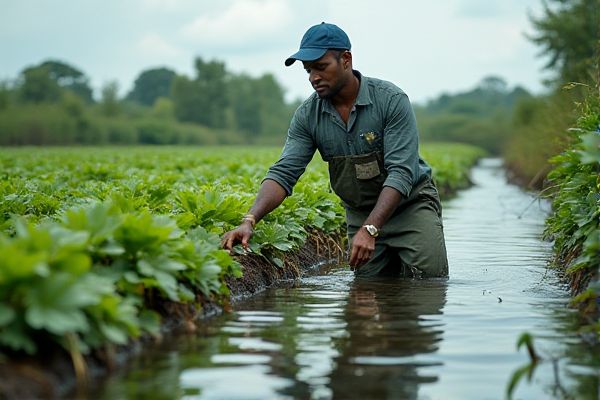
Nigeria's aquaculture sector is rapidly expanding, presenting numerous job opportunities across various roles. Positions include fish farming, feed production, and aquaculture technology development, catering to both skilled and unskilled workers. Research institutions and universities also seek professionals for roles in aquatic research and education, enhancing the knowledge base of the industry. Entrepreneurs can capitalize on this growth by starting their own aquaculture businesses, contributing to food security and economic development.
Job Description
Aquaculture jobs in Nigeria involve the cultivation of fish, shellfish, and aquatic plants to meet the growing demand for seafood. Responsibilities may include managing breeding, feeding, and harvesting processes, while also ensuring the maintenance of water quality and habitat conditions. Familiarity with local regulations and sustainable practices is essential for promoting environmental responsibility and economic viability. Opportunities in this sector can lead to roles in research, management, and food production, catering to both local and international markets.
Requirement
In Nigeria, pursuing a career in aquaculture requires relevant academic qualifications, typically a degree in fisheries, aquatic science, or marine biology. Practical experience in fish farming, hatchery management, and aquaculture systems is essential, as hands-on skills greatly enhance your employability in this sector. Knowledge of local aquatic ecosystems and sustainable practices is crucial to effectively address environmental challenges and ensure responsible fish production. Networking with local aquaculture associations can provide valuable opportunities and insights into the industry's latest trends and employment prospects.
Salary and Perks Expected
Salaries for aquaculture jobs in Nigeria can vary significantly based on experience, role, and location, typically ranging from 50,000 to 150,000 Nigerian Naira per month. Entry-level positions may offer lower wages, while experienced professionals in management or specialized roles can command higher salaries. Perks often include access to health insurance, transportation allowances, and opportunities for professional development. As the aquaculture sector continues to grow in Nigeria, job prospects in this field are becoming increasingly promising.
Similar Job Names
- Aquaculture Manager
- Fish Farm Supervisor
- Aquatic Veterinarian
- Hatchery Technician
- Fish Feed Analyst
- Aquaculture Research Scientist
- Aquatic Biologist
- Fish Health Inspector
- Pond Manager
- Aquaculture Business Consultant
- Marine Biotechnologist
- Aquaponics Specialist
- Fish Nutritionist
- Aquaculture Policy Analyst
- Environmental Compliance Officer
- Fish Breeding Specialist
- Aquaculture Equipment Technician
- Fish Welfare Officer
- Fisheries Extension Officer
- Quality Control Inspector
Job Expectation Concept
Aquaculture in Nigeria presents a significant opportunity for economic growth and food security, addressing the increasing demand for protein sources. Your understanding of local practices, species selection, and optimal farming techniques can enhance productivity and sustainability within the sector. The government encourages investments through initiatives and policies aimed at developing fish farming, reducing reliance on imports. Engaging with community-based programs and training can also help you stay informed about best practices and innovations in aquaculture.
Career Advantage and Weakness
Aquaculture in Nigeria offers significant career advantages, such as a growing demand for fish due to increasing population and dietary shifts towards protein-rich foods. Professionals in this field can benefit from government support and investment in sustainable practices, leading to innovative farming techniques and increased productivity. Challenges include environmental concerns and competition with wild-caught fish, which may affect market prices and job stability. Understanding these dynamics can help you navigate potential pitfalls while capitalizing on opportunities within the Nigerian aquaculture sector.
Important Thing Must Know
Aquaculture in Nigeria presents a unique opportunity for job seekers, with the potential to contribute significantly to food security and economic development. The demand for fish continues to rise, driven by population growth and dietary needs, creating numerous positions in fish farming, processing, and distribution. Knowledge of sustainable practices is crucial, as environmental preservation is increasingly prioritized within the industry. Understanding local regulations and market trends can enhance your chances of success and adaptability in this evolving field. Engaging with local communities and participating in cooperative initiatives can also provide valuable networking opportunities and support for your aquaculture endeavors.
Alternative Career Options
Exploring alternative career options in aquaculture in Nigeria can open various pathways beyond traditional roles. Opportunities include aquaponics farming, which combines fish farming with plant cultivation, allowing for sustainable production and resource efficiency. Engaging in aquaculture consultancy can also be rewarding, providing advice to farmers on best practices, health management, and business strategies. Research and development roles in governmental and non-governmental organizations contribute to policy-making and technological advancements, thus enhancing the industry's growth.
Companies List
- Fishery and Aquaculture Research Institute (FARI)
- Nigerian Institute for Oceanography and Marine Research (NIOMR)
- Aquaculture Association of Nigeria (AAN)
- Nigerian Fishers Cooperative
- MFB Aquaculture Limited
- Oyo State Ministry of Agriculture
- Farm Propagate Ltd.
- Thrive Fish Farms
- St. David's Aquaculture Farm
- Seafood Solutions Nigeria
List of Ideal City
Lagos, Nigeria's bustling economic hub, offers numerous opportunities in aquaculture, with its extensive coastline and demand for seafood supplies. Port Harcourt, located near oil-rich regions, provides a vibrant environment for aquaculture ventures, benefiting from access to quality water resources and a growing market. Abuja, as the capital city, is increasingly becoming a center for innovations in fish farming and aquaculture technology, attracting professionals seeking to expand their skills. Enugu, with its agricultural heart, supports various aquaculture initiatives and is ideal for those looking to engage with local fish farming communities.
 jobs-nigeria.com
jobs-nigeria.com